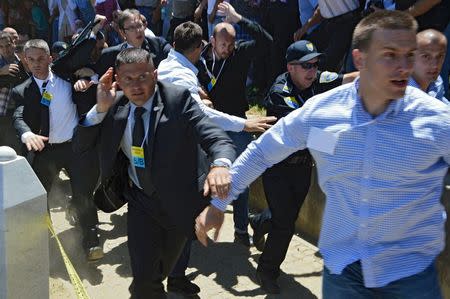Serbian PM hosts Bosnian leaders, cools tempers after mob attack

By Ivana Sekularac BELGRADE (Reuters) - Serbia's prime minister said on Wednesday he had already forgotten a mob attack on him in Bosnia 11 days ago as he hosted Bosnia's three-man presidency in a visit designed to cool tempers between the ex-Yugoslav republics. Aleksandar Vucic was hounded from a commemoration in eastern Bosnia marking the 20th anniversary of the massacre at Srebrenica of over 8,000 Muslim men and boys by Bosnian Serb forces in the closing months of the 1992-95 Bosnian war. Immediately after the assault by an angry crowd hurling stones, bottles and insults, Vucic called on Bosnia's tripartite presidency - part of a cumbersome power-sharing arrangement between Orthodox Serbs, Muslim Bosniaks and Catholic Croats - to visit the Serbian capital, once capital of federal Yugoslavia. During the visit, the leaders spoke of leaving 'history to historians', building a brighter future for the Balkans and of strolling the streets of Belgrade after a joint lunch. But they skirted around new tensions sparked by a Bosnian Serb plan to put the authority of Bosnia's national court to a referendum that the West says would challenge the very integrity of the state. "I have forgotten it," Vucic said of the assault in Srebrenica. "What happened to me was unpleasant and difficult, but it was nothing compared to what had happened to many Bosniaks, Serbs and Croats during the war", he said. "Our hand will remain outstretched. What else we can do? Fight again? Make the (river) Drina thick with blood again?" Serbia backed the Bosnian Serbs with men and money during the Bosnian war, in which 100,000 people died. A United Nations court has ruled that the Srebrenica mass killings constituted genocide, a term Serbia and many Serbs dispute. Vucic at the time was an outspoken ultranationalist. He has since rebranded himself as a pro-Western reformer dedicated to taking Serbia into the European Union. Last week, he urged Serbs in Bosnia to think again before holding a referendum on the authority of the national court over them, responding to Western warnings that the vote would represent an open threat to the integrity of the Bosnian state. "I believe we should leave history to historians," said Dragan Covic, the Croat chairman of the Bosnian presidency, at a joint news conference, "and that on the traces of past events we can build a new road of reconciliation." (Writing by Matt Robinson; Editing by Raissa Kasolowsky)

